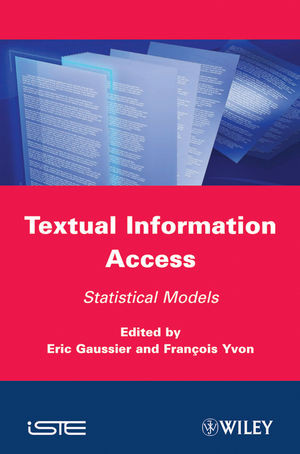

Most ebook files are in PDF format, so you can easily read them using various software such as Foxit Reader or directly on the Google Chrome browser.
Some ebook files are released by publishers in other formats such as .awz, .mobi, .epub, .fb2, etc. You may need to install specific software to read these formats on mobile/PC, such as Calibre.
Please read the tutorial at this link: https://ebookbell.com/faq
We offer FREE conversion to the popular formats you request; however, this may take some time. Therefore, right after payment, please email us, and we will try to provide the service as quickly as possible.
For some exceptional file formats or broken links (if any), please refrain from opening any disputes. Instead, email us first, and we will try to assist within a maximum of 6 hours.
EbookBell Team

5.0
58 reviewsThis book presents statistical models that have recently been developed within several research communities to access information contained in text collections. The problems considered are linked to applications aiming at facilitating information access:
- information extraction and retrieval;
- text classification and clustering;
- opinion mining;
- comprehension aids (automatic summarization, machine translation, visualization).
In order to give the reader as complete a description as possible, the focus is placed on the probability models used in the applications concerned, by highlighting the relationship between models and applications and by illustrating the behavior of each model on real collections.
Textual Information Access is organized around four themes: informational retrieval and ranking models, classification and clustering (regression logistics, kernel methods, Markov fields, etc.), multilingualism and machine translation, and emerging applications such as information exploration.
Contents
Part 1: Information Retrieval
1. Probabilistic Models for Information Retrieval, Stephane Clinchant and Eric Gaussier.
2. Learnable Ranking Models for Automatic Text Summarization and Information Retrieval, Massih-Reza Amini, David Buffoni, Patrick Gallinari,
Tuong Vinh Truong and Nicolas Usunier.
Part 2: Classification and Clustering
3. Logistic Regression and Text Classification, Sujeevan Aseervatham, Eric Gaussier, Anestis Antoniadis,
Michel Burlet and Yves Denneulin.
4. Kernel Methods for Textual Information Access, Jean-Michel Renders.
5. Topic-Based Generative Models for Text
Information Access, Jean-Cedric Chappelier.
6. Conditional Random Fields for Information Extraction, Isabelle Tellier and Marc Tommasi.
Part 3: Multilingualism
7. Statistical Methods for Machine Translation, Alexandre Allauzen and Francois Yvon.
Part 4: Emerging Applications
8. Information Mining: Methods and Interfaces for Accessing Complex Information, Josiane Mothe, Kurt Englmeier and Fionn Murtagh.
9. Opinion Detection as a Topic Classification Problem, Juan-Manuel Torres-Moreno, Marc El-Beze, Patrice Bellot and
Frederic Bechet.